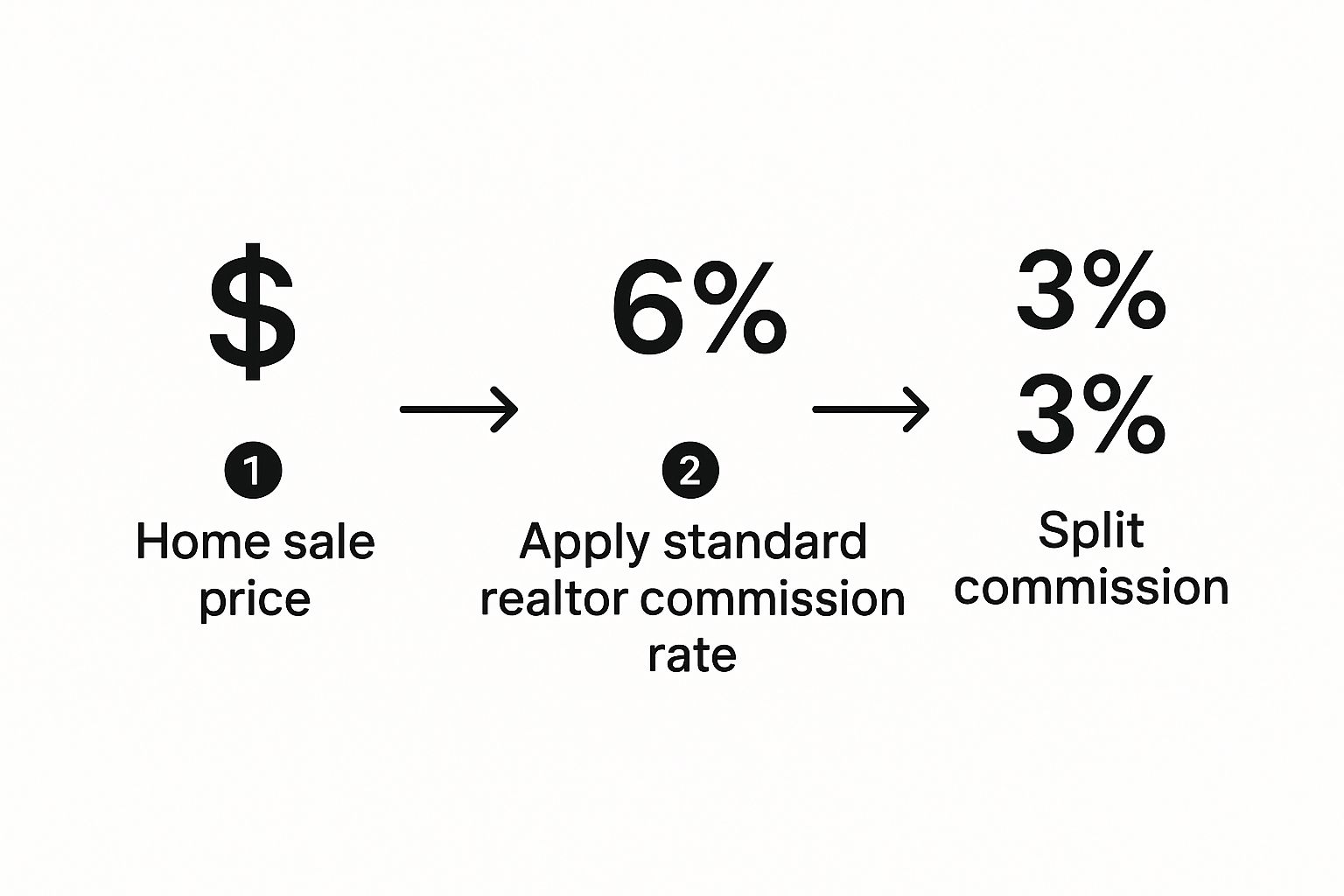Uncover who pays realtor fees in Vancouver and the Fraser Valley. Our guide breaks down BC's commission structure, negotiation tips, and seller closing costs.
READ MORE
Let's get right to the big question: who actually pays the realtor fees? In almost every real estate deal across Vancouver and the Fraser Valley, the answer is the seller. The total commission for both the seller's agent and the buyer's agent is paid by the seller from the proceeds of the sale.
This isn't an extra bill you get at the end; the fee is already factored into the home's final sale price. It comes out of the seller's pocket at closing, not as a separate, upfront cost.

When you’re browsing homes for sale on the MLS® in British Columbia, the price you see has already accounted for the expected real estate commission. This structure really simplifies things for buyers, as they typically don't pay any direct fees to their agent for helping them find and purchase a home.
Think of the seller as the one hosting the entire transaction. They are essentially hiring a professional team—their listing agent and the agent who brings the buyer—to market and successfully sell what is likely their most valuable asset. The total commission is simply the cost of bringing everyone together for a smooth and successful sale.
This standard arrangement is designed to make the market work better for everyone. It ensures buyers can get professional representation without worrying about a huge out-of-pocket expense, which naturally encourages more qualified buyers to enter the market. The seller, in turn, gets access to a much larger pool of potential buyers brought in by their respective agents. It’s a system built to get homes sold efficiently.
To make it even clearer, here’s a simple breakdown of how the commission payment typically flows from the seller to both agents involved.
As you can see, the money follows a clear path, starting with the seller and ultimately compensating both real estate professionals for their work.
This seller-pays model is the established convention in BC's real estate market. It ensures both the listing agent (who markets the property) and the buyer's agent (who brings the qualified purchaser) are compensated for their professional services from a single source.
So, we know who pays the realtor fees, but how are those fees actually calculated? It’s rarely a simple flat percentage here in Vancouver and the Fraser Valley. The most common approach is a tiered commission model, and it’s a much more balanced way of doing things.
This structure applies different percentage rates to different portions of the home's sale price. Think of it like income tax brackets. A very common setup you'll see is 7% on the first $100,000 of the sale price, and then a lower rate, like 2.5%, on the remaining balance. This ensures the commission is fair and scales properly with the home's total value.
To help you see how every dollar flows from the sale price to the final commission split, this infographic breaks it down.

As the visual shows, the total commission is calculated from the sale price first, and only then is it divided between the listing and buyer's agents.
Let's walk through an example with a realistic home price to see how this tiered model actually plays out. Imagine you're selling your home in the Fraser Valley for $950,000, a price point not uncommon for townhomes in the area as of late 2023.
Using that common tiered structure—7% on the first $100,000 and 2.5% on the rest—here's how the math works:
In this scenario, the total commission paid by you, the seller, from the proceeds of the sale would be $28,250. This is the gross amount before it gets split between the real estate brokerages. If you're curious about what your own home might sell for, you can always request a free, no-obligation home evaluation to get a clearer picture.
Once that total commission is calculated, it doesn't just go into one agent's pocket. The funds are first paid to the seller's (or listing) brokerage. From there, that brokerage splits the total amount with the buyer's brokerage.
The most common arrangement in British Columbia is a 50/50 split. This means both the listing agent and the buyer's agent are compensated equally for their roles in making the transaction happen.
Let's stick with our example:
Finally, each brokerage pays its agent their share based on their individual contract. It's a transparent process that ensures both professionals—the one who markets the home and the one who brings the qualified buyer—are fairly paid for their work. While the exact percentages can vary, this tiered model and subsequent split is the standard for most transactions across BC.

It can feel a bit strange at first glance—why would a seller pay the very person who's negotiating against them? But there's a powerful and time-tested business reason for it. When you decide to sell your home, you aren't just bringing one agent onto your team. You're actually mobilizing an entire network of real estate professionals to get your property sold for the best possible price.
The total commission shouldn't be seen as two separate fees, but as the single most important cost of doing business. It's the engine that powers the whole sales process, giving every qualified agent in the Vancouver and Fraser Valley area a compelling reason to show your home to their clients.
This practice is deeply embedded in Canadian real estate, though it faces legal challenges elsewhere. In British Columbia, this seller-pays system remains the standard, creating a broad, cooperative marketplace for listings.
Realtor fees are much more than just a payment for unlocking the front door. When a seller hires a listing agent, they're really investing in a complete marketing and sales package designed from the ground up to attract serious, qualified buyers.
This investment almost always includes:
This entire coordinated effort is the foundation for successfully selling your home for its true market value, especially in a competitive area.
So, why does that fee also cover the buyer’s agent? By offering compensation to the agent bringing the buyer, sellers instantly tap into a huge, pre-vetted pool of serious contenders. A buyer's agent has already done all the upfront work: verifying their client's finances, understanding their exact needs, and getting them ready to make a move.
Paying the buyer’s agent commission is the seller’s way of motivating every single realtor in the market to consider their property. It effectively turns thousands of agents into a potential sales team for that one home.
If this incentive didn't exist, the number of potential buyers would shrink dramatically. Sellers would miss out on countless opportunities because buyers' agents would naturally steer their clients toward properties where their professional services are compensated.
At the end of the day, the seller covers the full commission because it's the most effective strategy to market a property far and wide, attract the strongest offers, and secure a successful sale.
It's the question every home seller in Vancouver and the Fraser Valley eventually asks: can I really get a better rate on commission? The short answer is a resounding yes. In British Columbia, as in the rest of Canada, The Competition Act ensures there is no fixed or "standard" realtor fee. Every single commission is negotiable before you put ink to paper on a listing agreement.
Understanding this one fact puts a surprising amount of power in your hands as the seller. While the common practice is for the seller's proceeds to cover the full commission, the exact percentage or tiered structure is a critical part of the conversation you should be having with any agent you're considering.
Of course, not every situation is created equal when it comes to bargaining power. Certain factors can make your property a whole lot more attractive to an agent, giving them more room to be flexible on their fees.
You’re in a much stronger position to negotiate if:
If you want to land the best possible rate without skimping on service, you need to be proactive. The single most effective strategy is to interview at least three different real estate agents. This isn't just about hunting for the lowest fee; it's about seeing who brings the most value to the table.
During these interviews, ask each agent to walk you through their full marketing plan, break down their commission structure, and explain why their fee is what it is. This creates a competitive environment that naturally encourages agents to be more flexible. It also gives you a crystal-clear picture of who offers the best blend of service, expertise, and cost.
While negotiating a lower fee feels like a win, it's crucial to balance those savings against the quality of service. A discounted commission should never mean discounted results. Make sure the agent is still committed to professional photography, a comprehensive marketing strategy, and skilled negotiation to get you the best possible price.
As you start exploring your options, you'll inevitably run into both full-service and discount brokerages. A lower fee from a discount service can look tempting on the surface, but it almost always comes with trade-offs. You might get limited marketing exposure or find yourself managing showings and open houses on your own.
Many sellers discover that juggling the complexities of a sale, much like handling full-scale property management, requires far more expertise than they first thought.
On the other hand, a full-service agent justifies their commission by managing every last detail with one goal in mind: maximizing your final sale price. Their experience in pricing, marketing, and negotiation can often lead to a higher selling price that more than covers their fee.

While the seller-pays model is the standard way of doing things across Vancouver and the Fraser Valley, there are a few specific situations where the script gets flipped. In these rare but important exceptions, you—the buyer—might find yourself on the hook for paying your real estate agent's commission directly.
Getting a handle on these scenarios ahead of time is absolutely crucial. It means you can navigate the home buying journey without any nasty financial surprises just before closing, keeping you in complete control.
The most common situation where a buyer pays their agent's fee is in a 'For Sale By Owner' (FSBO) deal. Here, the homeowner decides to sell their property privately, without hiring a listing agent. Because of that, they haven't built a commission for the buyer's agent into their selling price.
If you happen to find your dream home and it's an FSBO, you still deserve to have a professional in your corner protecting your interests. But since the seller hasn't factored in a commission, you'll need to figure out a different way to make sure your realtor gets paid for all their hard work.
This is where a Buyer's Representation Agreement (BRA) comes in. To get that expert guidance in an FSBO sale, you'll sign a BRA with your realtor. Think of it as a formal contract that lays out your working relationship in black and white, detailing exactly what your agent will do for you and how they'll be compensated.
A Buyer's Representation Agreement is your key to protection in non-standard sales. It explicitly outlines your agent’s duties and the commission you agree to pay for their services, ensuring there are no surprises about who pays the realtor fees.
This agreement will specify the fee, which might be a fixed dollar amount or a percentage of the purchase price. With a BRA locked in, you can bring your trusted agent into the negotiation knowing they’ll handle the complex paperwork, offer strategic advice, and fight for your best interests.
Exploring all your options is a key part of the process when you're buying a home in this competitive market. Even in an FSBO sale, having an expert on your side is invaluable, and a BRA is what makes that possible.
So, let's pull it all together. By now, you've got a solid grasp of the single most important principle of real estate fees in British Columbia: it's typically the seller who foots the bill for the entire commission. That commission then gets split between the agent working for the seller and the one representing the buyer.
This simple piece of knowledge is incredibly powerful. It's the key that unlocks your understanding of BC’s tiered commission structures and gives you the confidence to have frank, productive conversations with potential agents, whether you're in Vancouver or out in the Fraser Valley. The biggest takeaway? Clear communication and a solid understanding of the process are your best friends.
Your ability to ask smart questions and truly appreciate the value a professional realtor brings to the table is what separates a stressful transaction from a successful one. This clarity paves the way for a transparent process from the first handshake to the final signature.
By doing your homework, you can step into the real estate market feeling prepared, not overwhelmed. A great next step in your financial planning is to get a handle on potential monthly costs with a mortgage payment calculator.
Ultimately, this foundational knowledge gives you the certainty you need to approach your next deal, aiming for nothing less than a smooth, rewarding, and successful outcome.
Even after you've got a good handle on the basics, the financial side of a real estate deal in British Columbia can still throw a few curveballs. It's totally normal to have some specific questions pop up. Let's tackle some of the most common ones we hear from our clients across Vancouver and the Fraser Valley.
This is a big one, and the answer is simple: No, the commission rates you see quoted are always before tax. In British Columbia, real estate services are subject to the 5% Goods and Services Tax (GST), just like many other professional services.
This tax is calculated on the final commission amount and the seller pays it from the sale proceeds. For instance, if the total commission on your home sale adds up to $30,000, you'll need to budget an extra $1,500 for GST ($30,000 x 5%). Forgetting about this can lead to a nasty surprise when you're calculating your final numbers, so always bake that 5% into your plan.
Absolutely. In fact, this is probably one of the strongest negotiating cards you can play. When you ask the same realtor to handle both the sale of your current home and the purchase of your next one, you're "bundling" services. Many agents are happy to offer a reduced commission rate on the sale because they're getting two transactions out of the relationship.
By offering an agent both your listing and your future purchase, you're giving them guaranteed business. That makes them much more open to being flexible on their selling commission. It's a classic win-win that rewards your loyalty with real savings.
The exact discount is always up for negotiation, but it’s a very common and effective way to lower your selling costs. Just make sure whatever you agree upon is documented clearly in your official listing contract to avoid any confusion down the road.
That's a sharp question, and it gets right to the heart of how real estate pricing works. While it's the seller who writes the cheque for the commission at closing, that cost is almost always factored into the home's listing price from day one.
Think about it from the seller's perspective. They start by figuring out the minimum amount they need to walk away with after everything is paid off. From there, they add on all their closing costs—including the full real estate commission—to land on their final list price. In that way, the commission is "baked into" the price of the home. So while you, the buyer, aren't paying the fee directly, the price you offer is definitely influenced by this major seller expense.
At Royal LePage Brookside Realty, our philosophy is simple: a well-informed client is an empowered client. Whether you're navigating the market as a buyer, seller, or investor in the Fraser Valley, our team is here to bring the clarity and expertise you need for a smooth, successful transaction. Contact us today to learn how we can help you achieve your real estate goals.